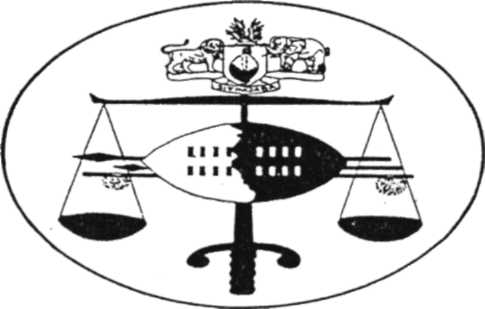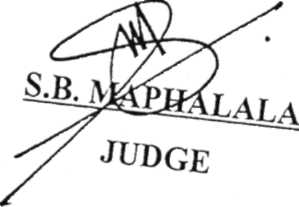
1
SWAZILAND ECUMENICAL CHURCH LOAN FUND Plaintiff And TREMO INVESTMENTS (PTY) LIMITED Defendant Civil Case No. 2025/2003 S.B. MAPHALALA - J MISS L. KUNENE MR. W. MKHATSHWA

Coram For the Plaintiff For the Defendant

JUDGMENT (09/07/2004) Before court is an application for default judgment in terms of Rule 31 (3) of the High Court Rules. The Defendant has raised a special plea. The cause of action in this matter arose in this way: On or about the 91 December 1999, at Manzini, the Plaintiff entered into a loan agreement with the Defendant in terms of which the Plaintiff lent and advanced monies to the Defendant. A copy of the loan approved document is annexed marked "SECLOF1".
The material terms were as follows: Loan amount E25, 000-00 Repayable over a period of one (1) year. Agreed interest rate - 22% per annum. Repayment at 12 months capital instalment of E2, 083-33 interest of E458-33 monthly. The Defendant has failed to pay the full amount plus interest and the total amount outstanding is E28, 504-59 computed as follows: Loan balance El9,216-90 Interest E 8,527-62 Penalty E 760-00 E28, 504-59 A copy of the statement reflecting the above is attached to the Plaintiffs papers, marked "SECLOF2". The relief being sought by the Plaintiff is payment of the sum of E28, 504-59, interest at the agreed rate of 22% per annum calculated from the date of service of summons to date of payment and costs of suit. The Defendant has raised a special plea that the claim is one of recovery of a debt in pursuance of a money lending transaction. It is alleged that the Plaintiff in its claim included a claim for interest at the rate of 22% per annum being in excess of the rate of 8% per annum allowed by the Money and Credit Finance Act No. 3 of 1991. The Defendant in its special plea prays for an order that the Plaintiff or its representatives be called as witnesses to prove its claim and Defendant or its representative be given an opportunity to examine Plaintiff and that the action be stated pending the examination.
It was contended on behalf of the Defendant when the special plea was argued that the principal debt upon which Plaintiffs claim is founded exceeds the sum of E500-00. Accordingly Section 3(1) (b) of the Act becomes applicable. The effect of which is that the loan agreement between the parties was null and void ab initio in that in terms of the said section interest on the loan of E5, 000-00, being more than E500-00 should not exceed 8% per annum. It was further argued for the Defendant that two (2) requirements must be satisfied for the operation of this Section. Firstly, the Defendant must establish on a balance of probabilities that the proceedings are for the recovery of a debt in pursuance of a money lending transaction as defined in the Act; and secondly, the Defendant must thereafter support its allegation concerning the excessive interest rate charge upon a sufficient foundation of fact to render its allegation prima facie acceptable. In support of these arguments the court's attention was drawn to the decided cases in Laztex (Pty) Ltd vs Telementry Equipment (Pty) Ltd 1976 (1) S.A. 74 (W); Adfin (Pty) Ltd t/a Rand Trust vs Fashion Shoe Centre (Pty) Ltd 1990 (4) S.A. 371 (c) and the Court of Appeal case of Reckson Mawelela vs MB Money Lenders Association -Appeal Case No. 43/1999 unreported. The final argument advanced on behalf of the Defendant is that if the agreement between the parties is unlawful for non-compliance with the Act, it must necessarily be void and unenforceable at law. Alternatively, the agreement cannot found a cause of action. The Plaintiff on the other hand contended that the Defendant's interpretation of Section 3 of the Act is incorrect on the basis that it was mainly done on an incomplete provision, which is meant to be read entirely and full interpretation be given in its entirety. The argument in this regard is that the Defendant only focussed on the first part of the provision which reads: "in excess of the rate of 8% per annum". Section 3 (1) (b) of the Act reads as follows: Maximum annual interest rate chargeable in respect of money-lending or credit transaction. 3. (1) Where in respect of any money-lending or credit transaction the principal debt
does not exceed E500 or such amount as may be prescribed from time to time, no lender shall charge an annual interest rate of more than 10 percentage points, or such amount as may be prescribed from time to time, above the rate for discounts, rediscounts or advances announced from time to time by the Central Bank under Section 38 of the Central Bank of Swaziland Order, 1974. Exceeds E500 or such amount as may be prescribed from time to time, no lender shall charge an annual interest rate of more than 8 percentage points, or such amount as may be prescribed from time to time, above the rate for discounts, rediscounts and advances announced from time to time by the Central Bank under Section 38 of the Central Bank of Swaziland Order, 1974. It is contended for the Plaintiff that the Defendant has conveniently disregarded the following portion of the provision and thus giving a completely different interpretation all together: "Above the rate for discounts, rediscounts and advances announced from time to time by the Central Bank under Section 38 of the Central bank of Swaziland Order 1974". According to the Plaintiff the correct interpretation of the word "above" is in addition to, which means the complete interpretation of Section 3 (1) (b) is that the lender shall not charge an annual interest rate in excess of 8% in addition to the discount, rediscount and advances announced from time to time (prime rate minus one). Miss Kunene arguing for the Plaintiff submitted that in the interpretation of a statute a court must look into the intention of the legislature in enacting a provision. In the present matter the legislature intended to regulate money-lending transaction in the country, to ensure that creditors did not charge exorbitant interest rates. Normal banking practice is to charge interest at prime (being the rate of discount published by the Central Bank) plus a certain percentage. The legislature intended to ensure that the percentage above prime rate was regulated. The intention of the legislature was not to outlaw or out market credit transactions. If creditors were to be restricted to 8% it would be meaningless as they would be sometimes well below the prime rate and even below the tempora morae interest of 9%.
According to Miss Kunene the Court of Appeal in Reckson Mawelela (supra) did not fully interpreted the provisions of the Act as Counsel for the Respondents (in that case) was unprepared, thus the comments by the court at page 7 as follows: "Not only did he fail to protect the interests of his client but he gave this court no assistance in its duty to decide the matter". In a nutshell, the Plaintiff contends that the interest rate is not in contravention of the Act hence is not null and void in terms of Section 6 (1) and is enforceable against the Defendant. Another issue which came up for argument was the Plaintiffs application to amend its declaration. Mr. Mkhatshwa took the other side to task that it had not followed the procedure by filing a proper application in this regard. A proper application has since been filed of record and in view of the fact that Mr. Mkhatshwa did not oppose the application for amendment in principle. I now grant the application to amend. The effect of the amendment is that the following is deleted: "(b) Interest on the aforesaid amount of E28, 504-59 at the agreed rate as per the loan agreement at the rate of 22% per annum calculated from the date of service of summons to date of final payment". Replacing it with the following: "(b) interest on the aforesaid amount of E28, 504-59 at the rate of 9% per annum a tempora morae calculated from date of summons to date of final payment". The first issue to be decided is whether Mr. Mkhatshwa is correct that a Defendant in an action for recovery of a debt who alleges that the Plaintiff had charged a rate of interest in excess of the maximum laid down by the Act, is entitled in terms of Section 6 of the Act, to examine the Plaintiff in regard to his claim. Section 6 of the relevant Act reads as follows:
6. (1) Any agreement in connection with any money-lending or credit transaction that is not in conformity with the provisions of this Act shall be null and void, and shall not be enforceable against the borrower or the credit receiver by the lender. (2) No lender shall in connection with any money-lending or credit transaction obtain a) the principal debt owed by the borrower or credit receiver; the interest charges on the principal debt; the additional finance charges calculated in the manner prescribed by Section 7; in the case where judgment is obtained for recovery of the principal debt or finance charges due from the borrower or credit receiver, legal costs awarded in terms of such judgment. (3) No lender shall in any proceedings against a borrower or credit receiver in respect of Can it be said that the Defendant's allegations that the amount of E28, 504-59 included finance charges in excess of what could lawfully be levied is prima facie without foundation? According to Leon J in the case of Wolsdorfvs Fisher 1977 (4) S.A. 74 D there can be no question of a Defendant having to discharge an onus of showing that his allegations concerning the rate of interest are true or probable or acceptable, and that once there is a foundation of fact in Defendant's allegations, even if the facts are improbable the provisions of the Act can be invoked by him. In casu paragraph 3 and 4 of the Defendant's plea contain the allegations of which Mr. Mkhatshwa relies for his invocation of Section 6 of the Act and these paragraphs reads as follows: -3- AD Paragraph 4 Defendant confesses existence of the agreement and terms thereof but disclaims liability on the basis that the agreement is void and unenforceable at law for non-compliance with the Money Lending and Credit Financing Act 1991.
judgment for or recover from a borrower or credit receiver an amount exceeding the
sum of:
any loss, damage or expense alleged to have been incurred by him in connection with
a money-lending or credit transaction, obtain judgment for any sum not recoverable
under subsection (1) of this Section.
AD Paragraph 5 Defendant denies being liable to the Plaintiff in the sum of E28, 504-59 (twenty-eight thousand five hundred and four emalangeni and fifty-nine cents). Defendant avers that it made payments to the Plaintiff totalling a sum in excess of E20, 000-00 (twenty thousand emalangeni) towards repayment of the initial sum borrowed together with interest at a rate legally permissible. It seems to me that on a careful analysis of what appears above Defendant's reliance on Section 6 of the Act is justified. Defendant contends that it made payments to the Plaintiff totalling a sum in excess of E20, 000-00 towards repayment of the initial sum borrowed with interest at a rate legally permissible therefore it becomes imperative that an enquiry be held in line with the legal authorities cited above. The Defendant has made its case to call upon the Plaintiff to prove its claim for the interest charged. In the case of Adfin (Pty) Ltd (supra) it was held as follows: "A Defendant in an action for recovery of a debt who alleges that the Plaintiff had charged a rate of interest in excess of the maximum laid down by the Usury Act 73 of 1968, is entitled in terms of Section 11 of the Act, to examine the Plaintiff in regard to his claim unless the court is of the opinion that the examination would be impracticable or that the Defendant's allegations are prima facie without foundation. In order to invoke Section 11, the Defendant must establish a foundation of fact in his allegations, but need not do so on anything approaching a balance of probabilities - there is no question of the Defendant having to discharge an onus of showing that his allegations concerning the rate of interest are true or probable or acceptable." I am in total agreement with the ratio enunciated above and find that the present case is at all fours with the facts of the case of Adfin (Pty) Ltd (op cit). I accordingly grant the following order: 1. The application for default judgement is stayed and the matter is adjourned sine die pending an enquiry to be heard on a date to be arranged with the Registrar.
2. Tile costs of the
over.

